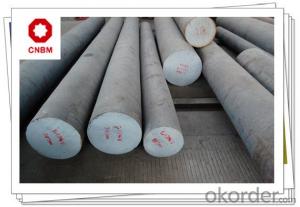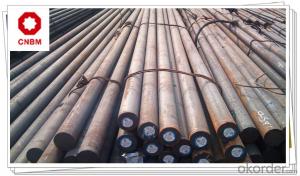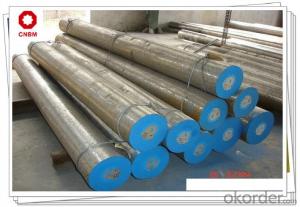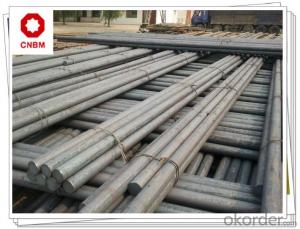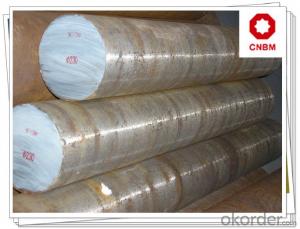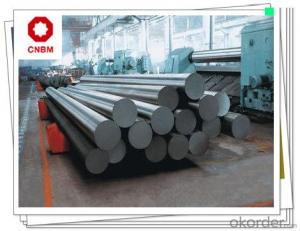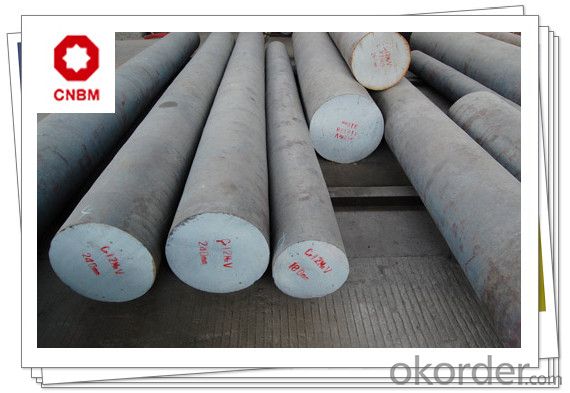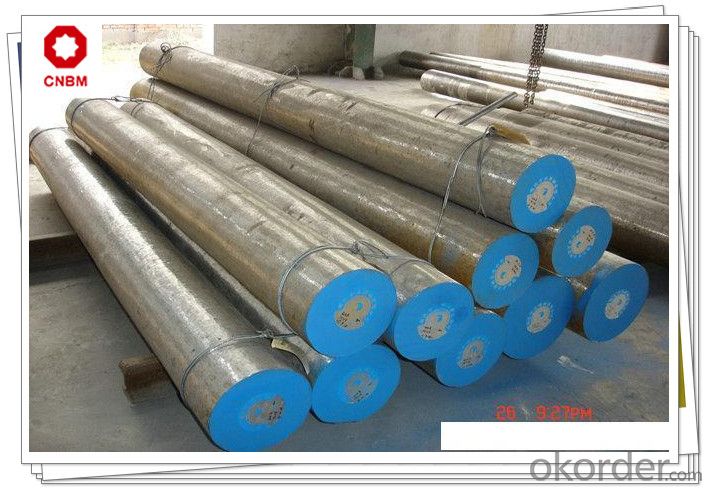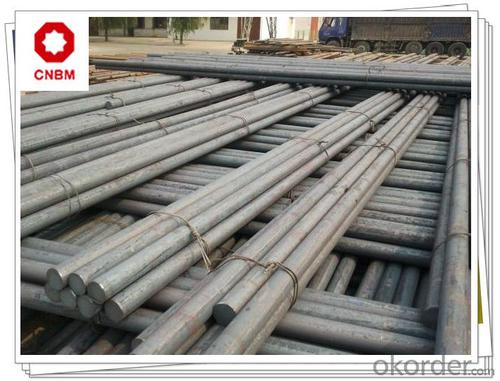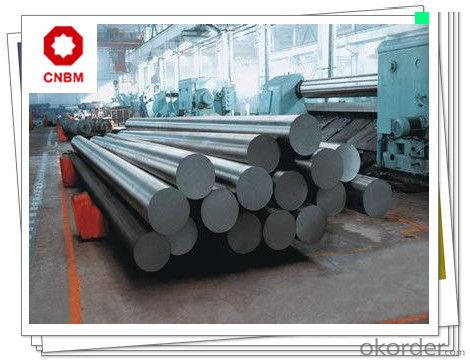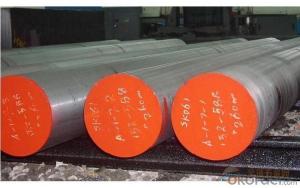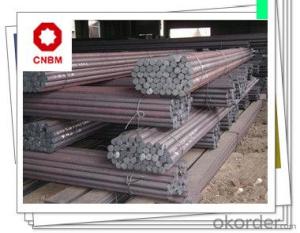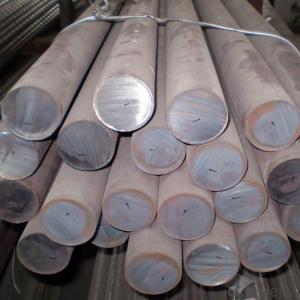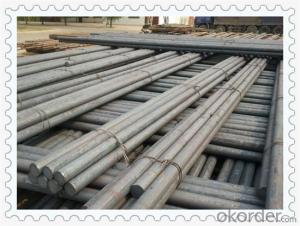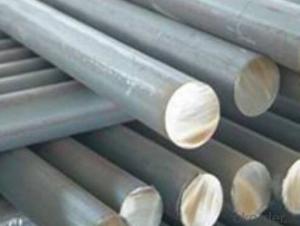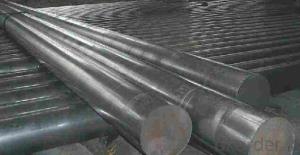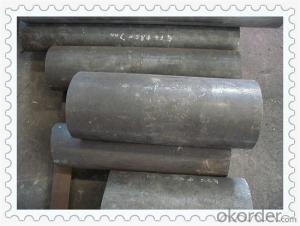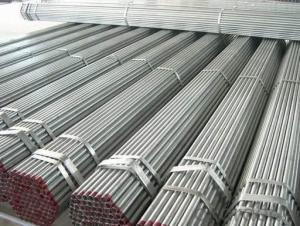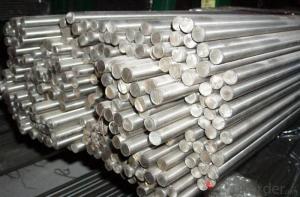aisi 4140 carbon alloy steel round bars
- Loading Port:
- Shanghai
- Payment Terms:
- TT OR LC
- Min Order Qty:
- 30 m.t.
- Supply Capability:
- 120000 m.t./month
OKorder Service Pledge
OKorder Financial Service
You Might Also Like
aisi 4140 Carbon Alloy Steel Round Bars
Specification
1, Diameter: 8mm-250mm rounds
5mm-9mm rods
2, Length: 2m, 3m, 5.8m, 6m or customized
3, Standard: GB, ASTM, AISI, SAE, DIN, JIS, EN
OEM technology - send detailed technical parameters for accurate quotation.
2, Produce Process: smelt iron - EAF smelt billet - ESR smelt billet -
hot rolled or forged to get the steel round bar and plate
3, Heat Treatment: annealing, normalizing, tempering, quenching
4, Surface Treatment: Black, Polished, Galvanized
5, Quality Assurance: We accept third party inspection for all orders.
You can ask testing organizations such as SGS, BV, etc. to test our products before shipping.
Equivalent grades
| GB | DIN | AISI | JIS |
| 42CrMo | 1.7225 | 4140 | SCM440 |
Chemical Composition
| C | Si | Mn | Cr | Mo | P | S |
| 0.38-0.43 | 0.40max | 0.60-0.90 | 0.90-1.20 | 0.15-0.30 | ≤0.035 | ≤0.035 |
Products Show
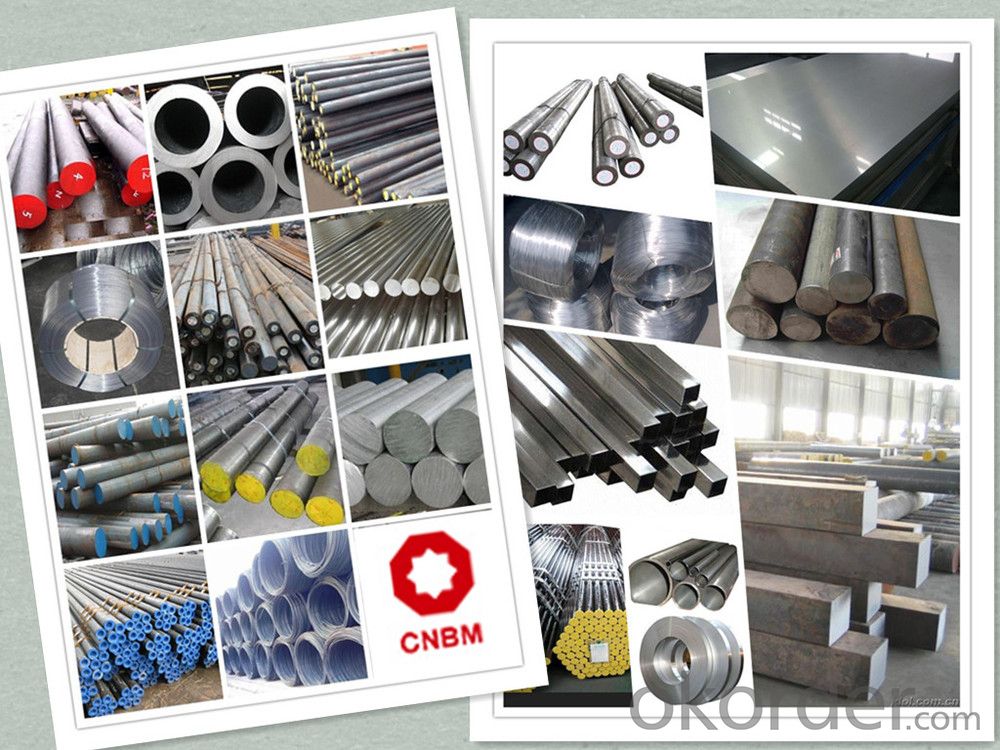
Product Overviews
| Product Name | Typical Grades | Diameter(mm) | Standard adopted |
| Carbon Steel | 20 (1020/S20C/C22) | Ø16-Ø300 |
GB/SAE/JIS/DIN
|
| 40 (1040/S40C/C40) | |||
| 45 (1045/S45C/C45) | |||
| Bearing Steel | GCr9 (51100/SUJ1) | Ø12-Ø250 | |
| GCr15 (52100/SUJ2/100Gr6) | |||
| GCr9SiMn (A485-Gr.1/SUJ3) | |||
Cr-Mo Steel | 20Cr (5120/SCr420H/20Cr4) | Ø12-Ø250 | |
| 40Cr (5140/SCr440/41Cr4) | |||
| 42CrMo(4140/SCM440/42CrMo4) | |||
| Gear Steel | 20CrNiMo | Ø16-Ø600 | |
| 20CrMn(5115/SMnC420/20MnCr5) | |||
| 20CrNiMo(8620/SNCM220/20CrMiMo2) |
Work Shop
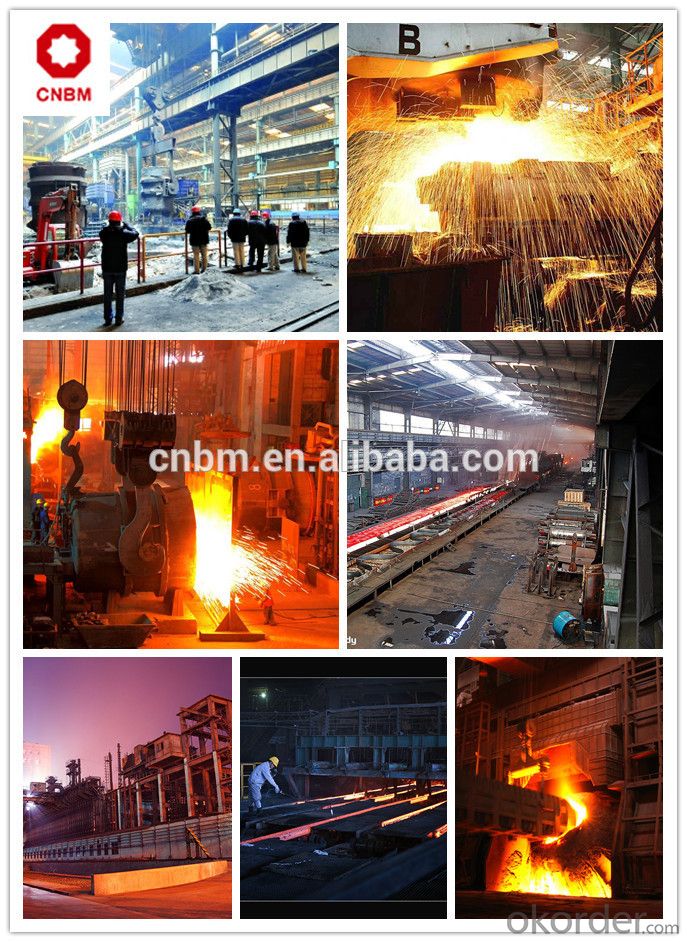
Company Information
CNBM International Corporation is the most important trading platform of CNBM group.
Whith its advantages, CNBM International are mainly concentrate on Cement, Glass, Iron and Steel, Ceramics industries and devotes herself for supplying high qulity series of refractories as well as technical consultancies and logistics solutions.

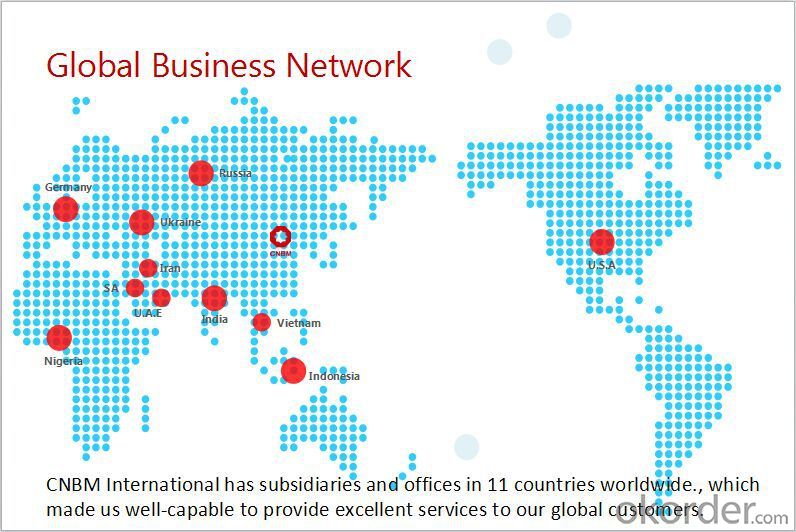
FAQ
1, Your advantages?
professional products inquiry, products knowledge train (for agents), smooth goods delivery, excellent customer solution proposale
2, Test & Certificate?
SGS test is available, customer inspection before shipping is welcome, third party inspection is no problem
3, Factory or Trading Company?
CNBM is a trading company but we have so many protocol factories and CNBM works as a trading department of these factories. Also CNBM is the holding company of many factories.
4, Payment Terms?
30% TT as deposit and 70% before delivery.
Irrevocable L/C at sight.
5, Trading Terms?
EXW, FOB, CIF, FFR, CNF
6, After-sale Service?
CNBM provides the services and support you need for every step of our cooperation. We're the business partner you can trust.
For any problem, please kindly contact us at any your convenient time.
We'll reply you in our first priority within 24 hours.
Packaging & Delivery
1, Packaging: seaworthy package or as required
2, Delivery: 35-45 days or based on quantity
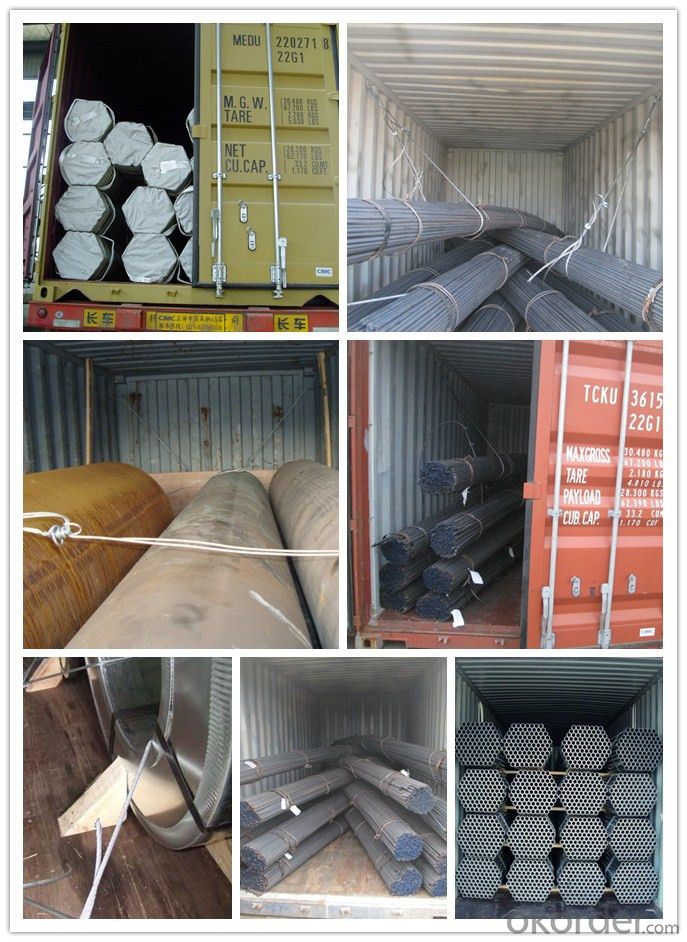
- Q: Are steel round bars suitable for electrical applications?
- No, steel round bars are not typically suitable for electrical applications. Electrical applications usually require materials with good electrical conductivity, such as copper or aluminum.
- Q: Can steel round bars be used for making furniture?
- Yes, steel round bars can be used for making furniture. Steel round bars are strong, durable, and have a sleek and modern appearance. They can be used to create various types of furniture, such as tables, chairs, stools, and shelving units. Steel round bars can be welded, bent, and shaped to create unique and custom designs. Additionally, they can be paired with other materials such as wood or glass to create a combination of textures and styles. Steel round bars also have the advantage of being resistant to corrosion, making them suitable for both indoor and outdoor furniture. Overall, steel round bars offer versatility and strength, making them an excellent choice for furniture-making projects.
- Q: What are the advantages of using nickel-tungsten alloy steel round bars?
- There are several advantages of using nickel-tungsten alloy steel round bars: 1. High strength and durability: Nickel-tungsten alloy steel round bars have excellent strength and durability properties. This makes them suitable for applications that require resistance to wear, fatigue, and high-temperature environments. 2. Corrosion resistance: The addition of nickel in the alloy enhances its corrosion resistance properties. This makes nickel-tungsten alloy steel round bars highly resistant to various corrosive environments, including acids, alkalis, and seawater. 3. Excellent heat resistance: Nickel-tungsten alloy steel round bars exhibit excellent heat resistance, which allows them to maintain their mechanical properties even at elevated temperatures. This makes them ideal for applications that involve high-temperature environments, such as in the aerospace and automotive industries. 4. Good electrical conductivity: The inclusion of tungsten in the alloy enhances its electrical conductivity properties. This makes nickel-tungsten alloy steel round bars suitable for applications that require good electrical conductivity, such as in electrical connectors and electronic devices. 5. Machinability: Nickel-tungsten alloy steel round bars are relatively easy to machine, allowing for the production of complex shapes and designs. This makes them versatile and suitable for various manufacturing processes, including machining, forging, and welding. 6. Cost-effective: Despite their advantageous properties, nickel-tungsten alloy steel round bars are relatively cost-effective compared to other high-performance alloys. This makes them a cost-efficient choice for many industries, as they offer a balance between performance and affordability. Overall, the advantages of using nickel-tungsten alloy steel round bars make them a preferred material for a wide range of applications, including aerospace, automotive, electrical, and manufacturing industries.
- Q: What are the tolerances for steel round bars?
- The tolerances of steel round bars can differ based on the specific requirements of the application and manufacturing process. Generally, steel round bars have specified tolerances for diameter, straightness, and length. For diameter tolerance, it is usual to find tolerances ranging from +/- 0.001 inches to +/- 0.005 inches. This means that the actual diameter of the steel round bar can deviate within this range from the specified diameter. The size and grade of the bar determine the specific tolerance. Straightness tolerance refers to the permissible deviation in the straightness of the bar. Typically, it is specified as a maximum deviation per unit length, such as 0.125 inches per foot. This ensures that the bar remains straight and within acceptable limits when measured along its length. Length tolerance determines the allowable variation in the overall length of the round bar. It can range from +/- 0.125 inches to +/- 0.5 inches, depending on the size and grade of the bar. This ensures that the bar meets the required length specifications. It is important to note that these tolerances can vary based on industry standards, customer specifications, and the manufacturing method employed. Moreover, certain applications may have stricter tolerance requirements, particularly in industries like aerospace or automotive where precision is crucial. To summarize, the tolerances for steel round bars encompass diameter, straightness, and length. The specific tolerances depend on the size, grade, and application of the round bar, as well as any relevant industry standards or customer specifications.
- Q: What are the advantages of using free-cutting steel round bars?
- Free-cutting steel round bars boast numerous advantages. Firstly, their impeccable machinability sets them apart. These bars are specifically designed for easy machining, allowing for smooth and efficient cutting, drilling, and shaping processes. This makes them highly suitable for applications that demand precision and intricate detailing, such as the production of automotive components, machinery parts, and precision instruments. Secondly, free-cutting steel round bars offer enhanced productivity and reduced manufacturing costs. Thanks to their superior machinability, these bars significantly reduce the time and effort required for machining, resulting in higher production rates and increased efficiency. Additionally, the reduced wear and tear on cutting tools lengthens their lifespan, thereby reducing tool replacement costs and overall manufacturing expenses. Moreover, free-cutting steel round bars excel in chip control. During machining, the chips produced can impact the final product's surface finish and dimensional accuracy. However, free-cutting steel round bars are specifically formulated to generate small, manageable chips that are easily expelled from the cutting zone. This not only enhances the quality of machined parts but also minimizes the risk of chip clogging or chip-related issues. Another advantage of utilizing free-cutting steel round bars lies in their superb surface finish. These bars are often manufactured with a fine grain structure and minimal impurities, resulting in a smooth and visually appealing surface finish. This becomes particularly crucial for applications where aesthetics and appearance play a significant role, such as in architectural designs or decorative purposes. Lastly, free-cutting steel round bars offer exceptional mechanical properties. They are typically produced with controlled chemical compositions and undergo precise heat treatments, ensuring consistent and reliable mechanical performance. This renders them suitable for demanding applications that necessitate high strength, toughness, and durability. In conclusion, the benefits of employing free-cutting steel round bars encompass exceptional machinability, improved productivity, reduced manufacturing costs, superior chip control, enhanced surface finish, and reliable mechanical properties. These advantages establish free-cutting steel round bars as the preferred choice in various industries and applications.
- Q: What are the advantages of using heat-resistant steel round bars?
- Heat-resistant steel round bars have several advantages. Firstly, they are designed specifically to maintain their mechanical properties even in high temperatures. This means they can remain strong and structurally sound in extreme heat conditions. Secondly, these round bars have exceptional resistance to corrosion. This makes them highly durable and suitable for environments where they may come into contact with corrosive substances or chemicals. Their resistance to corrosion ensures a longer lifespan and reduces the need for frequent maintenance or replacement. Additionally, heat-resistant steel round bars have superior thermal conductivity. This allows them to efficiently transfer heat, which is beneficial in industries like power generation or petrochemicals where heat transfer is crucial. Using heat-resistant steel round bars guarantees optimal performance and energy efficiency. Furthermore, these round bars offer excellent dimensional stability. Even when exposed to high temperatures, they retain their shape and size without warping or deforming. This is particularly important in applications that require precise measurements and tight tolerances. Lastly, heat-resistant steel round bars come in various sizes and grades, offering versatility in their applications. They can be used in industries such as aerospace, automotive, construction, and manufacturing, where high temperatures are involved. In conclusion, the advantages of using heat-resistant steel round bars include their ability to withstand high temperatures, resistance to corrosion, superior thermal conductivity, dimensional stability, and versatility in applications. These benefits make them an ideal choice for industries that require materials to perform reliably under extreme heat conditions.
- Q: Round bars and ribbed stirrups are much better
- The flexibility of hot rolled round steel bar is better than that of ribbed steel bar, and its fatigue stress amplitude is wide allowable. It is suitable for the components under dynamic load, as well as lifting rings, rings and lifting workpieces;
- Q: Can steel round bars be used in the manufacturing of pumps?
- Indeed, pumps can be manufactured using steel round bars. These round bars are widely utilized in diverse industries owing to their robustness, longevity, and adaptability. In the realm of pump manufacturing, steel round bars are frequently employed as shafts or rotors due to their capacity to endure intense pressure and rotational forces. To meet the specific demands of pump designs, these round bars can be subjected to machining, forging, or heat treatment processes. Moreover, steel round bars offer exceptional resistance to corrosion, rendering them suitable for pumps deployed in a variety of environments. On the whole, steel round bars constitute a dependable and prevalent material in the realm of pump manufacturing.
- Q: Can steel round bars be used in the food processing industry?
- No, steel round bars are not typically used in the food processing industry as they can potentially contaminate the food due to their composition and surface characteristics. Food-grade materials such as stainless steel are preferred for their corrosion resistance and hygienic properties in order to maintain the integrity and safety of the food being processed.
- Q: What are the typical price ranges for steel round bars?
- The typical price ranges for steel round bars vary depending on factors such as the diameter, length, grade, and market conditions. However, generally speaking, the price range for steel round bars can range from $0.50 to $3 per pound or more.
Send your message to us
aisi 4140 carbon alloy steel round bars
- Loading Port:
- Shanghai
- Payment Terms:
- TT OR LC
- Min Order Qty:
- 30 m.t.
- Supply Capability:
- 120000 m.t./month
OKorder Service Pledge
OKorder Financial Service
Similar products
Hot products
Hot Searches
Related keywords
